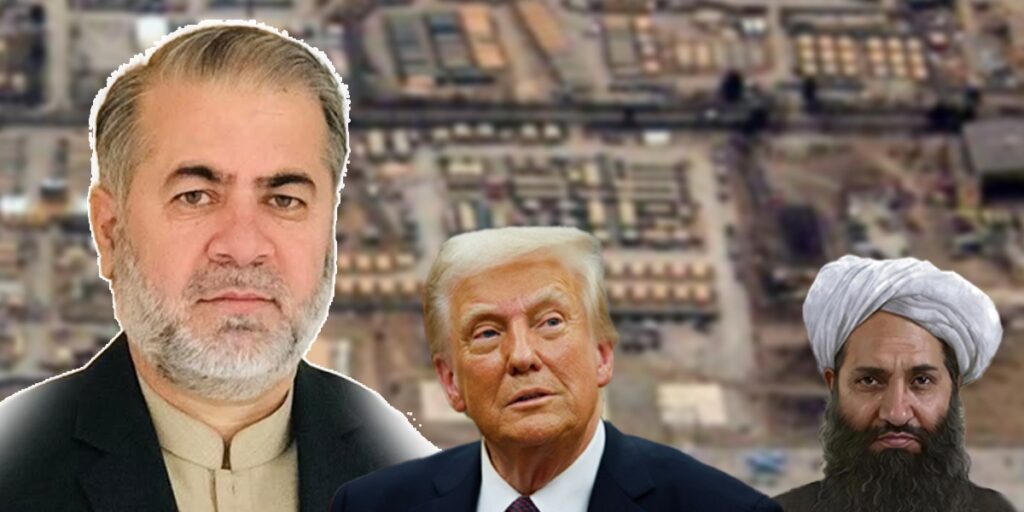Mushtaq Yusufzai
The Afghan Taliban’s handling of critical decisions has profound implications for the future of Afghanistan, particularly in relation to their relationship with the United States and neighboring countries.One of the most contentious issues is the potential handover of Bagram Airbase to the US If such a decision were to be made, it would be a dangerous and self-destructive move for the Taliban.The Taliban, given their current position, cannot afford to take such a massive risk. Surrendering such a strategic asset would not only harm their standing but could also undermine their entire political narrative.
In this context, the role of Pakistan cannot be overlooke US President Donald Trump has publicly acknowledged the significant contributions of Pakistan’s security and intelligence agencies in the region. Pakistan has been a pivotal ally in US efforts in Afghanistan, as the only nuclear-armed Muslim country in the region.Trump himself emphasised that if Pakistan had not played its part, the United States would still be embroiled in the Afghan conflict. Yet, despite Pakistan’s strategic support, Afghanistan has failed to fully appreciate Pakistan’s loyalty and contributions, often misinterpreting these efforts.Recent developments, such as videos confirming Afghan madrassa students being taken to Pakistan for jihad, only complicate the relationship between the two countries.
Historically, whenever Afghanistan has faced crises, its citizens have sought refuge in Pakistan. Unlike Iran, which has confined Afghan refugees to camps, Pakistan has opened its borders, allowing them to move freely within the country.Cities such as Karachi, Islamabad, and Lahore have welcomed Afghan refugees, offering them opportunities for a better life. Despite this generosity, certain disruptive elements continue to undermine the relationship, sowing distrust between the Taliban and Pakistan.
On the front of counterterrorism, Pakistan has consistently demonstrated its commitment to fighting terrorism alongside the United States. When needed, the US has always turned to Pakistan for assistance. Pakistan’s security measures, such as the construction of barbed-wire fences along its borders to prevent terrorism and smuggling, have been essential, though challenges persist as militants continue to breach the fences in certain areas. Furthermore, the rise of ISIS (Daesh) has posed significant challenges to the Taliban, exacerbating the security situation in Afghanistan.
A recent example of Pakistan’s commitment to counterterrorism came when the country’s security agencies apprehended the mastermind behind the Kabul airport attack and handed him over to the United States. This was a crucial step in the fight against terrorism, and it would have been expected that the Afghan Taliban would recognize and appreciate this gesture. Unfortunately, instead of acknowledging Pakistan’s role, the Afghan government chose to place blame on Pakistan, which only serves to further strain relations.
Despite the continued U.S. aid to Afghanistan, it is important to note that Pakistan has made far greater sacrifices in the fight against terrorism. The Afghan Taliban and the Tehrik-i-Taliban Pakistan (TTP) have been close allies in their opposition to the US, and this longstanding partnership complicates Pakistan’s security situation. It is vital to recognise the extent of Pakistan’s contributions, which have often gone unappreciated.
The statements made by Khyber Pakhtunkhwa Chief Minister Sardar Ali Amin Gandapur regarding Afghan refugees have also raised concerns. His remarks, which reflect a political stance, seem driven more by sympathy for Afghan refugees than by a comprehensive approach to the national security challenges posed by illegal immigration. Gandapur’s double standards in this regard need to be reconsidered, as they seem to neglect the broader security implications of unregulated refugee movements.
In conclusion, the complexities surrounding the relationship between Pakistan and the Afghan Taliban are undeniable. Pakistan has played a crucial role in regional stability, and its contributions should be recognized as such.
At the same time, it is essential for both Pakistan and Afghanistan to foster mutual understanding and cooperation to address the challenges posed by terrorism, refugee movements, and regional geopolitics. Pakistan must continue to navigate these complex dynamics while protecting its national security interests and preserving its role as a key player in the region.





